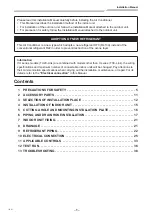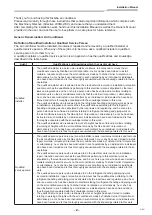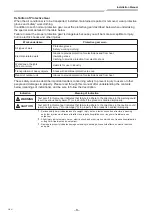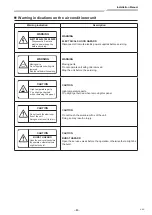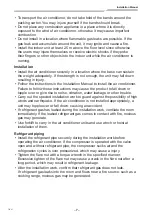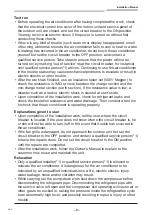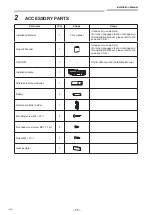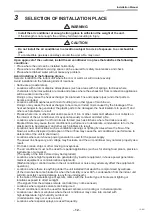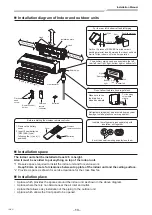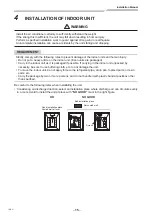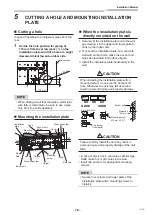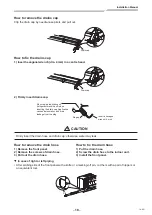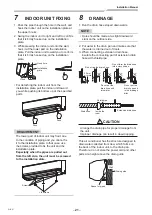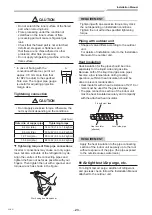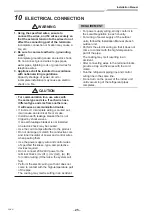
‒
12
‒
12-EN
Installation Manual
3
SELECTION OF INSTALLATION PLACE
WARNING
•
Install the air conditioner at enough strong place to withstand the weight of the unit.
If the strength is not enough, the unit may fall down resulting in injury.
CAUTION
•
Do not install the air conditioner in a location subject to a risk of exposure to a combustible
gas.
If a combustible gas leaks and stays around the unit, a
fi
re may occur.
Upon approval of the customer, install the air conditioner in a place that satis
fi
es the following
conditions.
• Place where the unit can be installed horizontally.
• Place where a suf
fi
cient servicing space can be ensured for safety maintenance and check.
• Place where drained water will not cause any problem.
Avoid installing in the following places.
Select a location for the indoor unit where the cool or warm air will circulate evenly.
Avoid installation in the following kinds of locations.
• Saline area (coastal area).
• Locations with acidic or alkaline atmospheres (such as areas with hot springs, factories where
chemicals or pharmaceuticals are made and places where the exhaust air from combustion appliances
will be sucked into the unit).
Doing so may cause the heat exchanger (its aluminum
fi
ns and copper pipes) and other parts to
become corroded.
• Locations with atmospheres with mist of cutting oil or other types of machine oil.
Doing so may cause the heat exchanger to become corroded, mists caused by the blockage of the
heat exchanger to be generated, the plastic parts to be damaged, the heat insulators to peel off, and
other such problems to result.
• Places where iron or other metal dust is present. If iron or other metal dust adheres to or collects on
the interior of the air conditioner, it may spontaneously combust and start a
fi
re.
• Locations where vapors from food oils are formed (such as kitchens where food oils are used).
Blocked
fi
lters may cause the air conditioner’s performance to deteriorate, condensation to form, the
plastic parts to be damaged, and other such problems to result.
• Locations near obstructions such as ventilation openings or lighting
fi
xtures where the
fl
ow of the
blown air will be disrupted (a disruption of the air
fl
ow may cause the air conditioner’s performance to
deteriorate or the unit to shut down).
• Locations where an in-house power generator is used for the power supply.
The power line frequency and voltage may
fl
uctuate, and the air conditioner may not work properly as a
result.
• On truck cranes, ships or other moving conveyances.
• The air conditioner must not be used for special applications (such as for storing food, plants, precision
instruments or art works).
(The quality of the items stored may be degraded.)
• Locations where high frequencies are generated (by inverter equipment, in-house power generators,
medical equipment or communication equipment).
(Malfunctioning or control trouble in the air conditioner or noise may adversely affect the equipment’s
operation.)
• Locations where there is anything under the unit installed that would be compromised by wetness.
(If the drain has become blocked or when the humidity is over 80%, condensation from the indoor unit
will drip, possibly causing damage to anything underneath.)
• In the case of the wireless type of system, rooms with the inverter type of
fl
uorescent lighting or
locations exposed to direct sunlight.
(The signals from the wireless remote controller may not be sensed.)
• Locations where organic solvents are being used.
• The air conditioner cannot be used for liqueed carbonic acid cooling or in chemical plants.
• Location near doors or windows where the air conditioner may come into contact with
high-temperature, high-humidity outdoor air.
(Condensation may occur as a result.)
• Locations where special sprays are used frequently.


